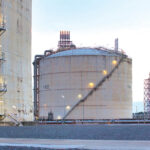As Brunei Darussalam is blessed with substantial reserves of oil and gas, the energy sector plays a pivotal role in the country’s economic prosperity. The Department of Energy at the Prime Minister’s Office contributes to the energy sector development including oil and gas, power sector and renewable energy.
The department aims to maintain the production of 300,000 barrels of oil equivalent per day (300kboe/d) in the medium term. In the long term, this will increase to approximately 350kboe/d.
This was shared by Minister at the Prime Minister’s Office and Minister of Defence II Pehin Datu Lailaraja Major General (Rtd) Dato Paduka Seri Haji Awang Halbi bin Haji Mohd Yussof during the 19th Legislative Council (LegCo) session in March 2023.
 One of the many efforts to maximise the production of oil and gas in the country includes cooperating with OPEC+ countries to stabilise the oil market. This will benefit both the producers and consumers in the long run, he said.
One of the many efforts to maximise the production of oil and gas in the country includes cooperating with OPEC+ countries to stabilise the oil market. This will benefit both the producers and consumers in the long run, he said.
“Alhamdulillah, OPEC+’s efforts have been successful in restoring oil prices to a reasonable level and guarantee oil supply in the future. A stable oil price at a reasonable level also has a more significant impact on the national income,” said the minister.
According to the minister, Brunei’s net income from the upstream oil and gas sector in 2022 was the highest since 2014.
The oil and gas industry has contributed significantly to Brunei’s economy since the commercial discovery of oil in 1929. Brunei Shell Petroleum Company Sdn Bhd (BSP) is the largest oil producer in Brunei and contributes around 90 per cent to Brunei’s oil and gas revenues.
Petroleum Authority of Brunei Darussalam
The Petroleum Authority of Brunei Darussalam is the central authority regulating the country’s oil and gas industry. As the technical arm to the Department of Energy at the Prime Minister’s Office, the Petroleum Authority advises on matters relevant to the oil and gas industry to ensure sustainable development of all hydrocarbon resources and value chain.
The Petroleum Authority’s long-term vision for the industry revolves around establishing a progressive and resilient industry that is perceptive to the everchanging market.
To attain this vision, three strategic objectives have been set by the Department of Energy at the Prime Minister’s Office: diversification of the energy sector; effective and sustainable hydrocarbon resource management; and robust and conducive regulatory framework and safety standards.
PMB Phase 2 Development Project
In a significant development for Brunei’s economy and energy sector, the Petroleum Authority of Brunei Darussalam and the Brunei Economic Development Board (BEDB) in November 2023 signed the Implementation Agreement for the Pulau Muara Besar (PMB) Phase 2 Development Project with Hengyi Industries Sdn Bhd (Hengyi).
The project will enable production of new refined petroleum products such as ethylene, polyethylene, butadiene, and polypropylene. These will serve as raw materials for downstream industries, spanning from textiles to agriculture and automobile to electronics manufacturing. Upon completion, the Phase 2 project is expected to generate over 2,000 job opportunities. Half of these positions will be allocated for Bruneians when operations commence in 2029, thereby playing a pivotal role in advancing Brunei’s socio-economic development.
Since its commissioning in 2019, Hengyi has been instrumental in strengthening Brunei’s energy security, and driving the country’s economic growth. The agreement represents a crucial step forward in Brunei’s sustained commitment to fostering growth in the downstream oil and gas sector.
This initiative also aligns with Brunei’s vision outlined in the Brunei Vision 2035 and the Economic Blueprint, reinforcing the nation’s dedication to strategic development. In addition, it underscores the robust partnership between Brunei Darussalam and China in advancing economic diversification, particularly by boosting the petrochemical sector’s growth.
Towards a greener Future
 Brunei’s transition towards green energy requires not only a whole-of-nation approach, but also regional collaboration as the country aims to advance its national solar energy target to 200 megawatts by 2025, with solar power making up at least 30 per cent of the overall power generation mix by 2035. This was highlighted by Minister at the Prime Minister’s Office and Minister of Defence II Pehin Datu Lailaraja Major General (Rtd) Dato Paduka Seri Haji Awang Halbi bin Haji Mohd Yussof at the launch of the Energy Seminar in July 2023.
Brunei’s transition towards green energy requires not only a whole-of-nation approach, but also regional collaboration as the country aims to advance its national solar energy target to 200 megawatts by 2025, with solar power making up at least 30 per cent of the overall power generation mix by 2035. This was highlighted by Minister at the Prime Minister’s Office and Minister of Defence II Pehin Datu Lailaraja Major General (Rtd) Dato Paduka Seri Haji Awang Halbi bin Haji Mohd Yussof at the launch of the Energy Seminar in July 2023.
According to the minister, Brunei is actively exploring the potential for renewable energy-based connectivity by establishing interconnections with neighbouring countries. Oil and gas will remain integral to the regional energy mix during the ongoing energy transition.
The minister called on oil and gas industry players to play their part in realising the energy transition. He outlined three key steps of emissions mitigation: application of renewable or cleaner alternative energy; optimising current operations to lower emissions; and effective carbon capture and storage (CCS). The country will also develop a regulatory framework that would promote application of CCS.
Given Brunei’s constraints with limited solar energy opportunities, focusing on the production of hydrogen and implementing carbon capture, utilisation, and storage (CCUS) technologies would be beneficial. The country can efficiently harness its gas reserves and reduce its emissions, said the special advisor to the president on energy affairs at the Economic Research Institute for ASEAN and East Asia (ERIA) Shigeru Kimura in a side-line interview at the Energy Seminar.
As a key player in the global oil and gas market, Brunei holds a crucial role in exporting gas and liquefied natural gas (LNG), he said. To ensure a sustainable and environmentally responsible approach, it is imperative for the nation to prioritise the adoption of CCUS technologies in its gas and LNG production processes.
Transitioning from natural gas production to hydrogen is also an option, in line with the country’s commitment to protecting the environment. Brunei stands to gain substantial advantages through collaboration with nations such as Japan and Australia, fostering the exchange and support of green technology.
Meanwhile, a recent study by the Economic Research Institute for ASEAN and East Asia on Green Hydrogen Production in Brunei Darussalam emphasised the nation’s shift towards carbon neutrality by 2050. This necessitates a transition from traditional oil and gas to cleaner fuels such as hydrogen for domestic production and export.
Producing green hydrogen requires tapping into renewable energies. However, Brunei faces limitations in solar photovoltaic (PV) potential due to land constraints. While floating solar PV (FSPV) is an option, Brunei’s water surface is also limited. Consequently, the production of blue hydrogen from natural gas remains a crucial alternative.
The estimated production cost of green hydrogen in Brunei ranges from USD3.5 to USD5.2 per kg-H2, slightly higher than the global target of USD1 to USD2 per kg-H2. Production costs can be reduced by adopting lower-priced solar PV systems and enhancing electrolysis technology efficiency.
Although the green hydrogen industry in Brunei requires substantial investment, it promises various benefits, including the creation of skilled labour opportunities and economic growth on a macro scale.
Embracing green hydrogen will play a pivotal role in Brunei’s journey towards carbon neutrality, ensuring a sustainable and cleaner future for the nation.
Brunei Energy Industry Integrity Pact
Established in 2017, the Brunei Energy Industry Integrity Pact (BEIIP) represents the energy industry’s commitment in upholding business integrity and fight against any form of corruption. This is delivered through 10 essential principles which the signatory companies shall incorporate into their ways of working. By agreeing to this Pact, the industry conveys its zero-tolerance message that any company lacking integrity and transparency will not have the opportunity to do business with any of the oil and gas operators in Brunei.
As of 2023, the BEIIP is made up of 108 members consisting of both international and local companies.
MITSUBISHI CORPORATION
Established in 1954, Mitsubishi Corporation (MC) is a global integrated business enterprise headquartered in Japan that develops and operates businesses together with its offices and subsidiaries worldwide.
MC has 10 business groups that operate across virtually every industry: natural gas, industrial materials, petroleum and chemicals, mineral resources, industrial infrastructure, automotive and mobility, food industry, consumer industry, power solution and urban development. Through its 10 business groups, MC’s current business activities have expanded far beyond its trading operations to include business development, production and manufacturing operations, working in collaboration with its trusted partners around the globe.
As a shareholder of Brunei LNG Sdn Bhd, MC has been involved in the country’s liquefied natural gas (LNG) business from the beginning since the establishment of Brunei LNG in 1969 and the first LNG cargo delivery from Brunei to Japan in 1972. Since the first shipment to Japan, LNG produced in Brunei has contributed to the development of the industry and daily life in Japan.
Furthermore, in 2000 and after, MC acquired ownership of companies owning LNG carriers to join the LNG transportation sector and also participated in a Block CA2 upstream development. For over 50 years, MC has built a value chain that covers throughout upstream, liquefaction, sales and transportation. Aside from the LNG business in Brunei, MC is also involved in businesses MC Biotech (Astaxanthin) and Dart Shuttle Service in the country.
In order to promote the development of renewable energy in Brunei, MC in collaboration with the Brunei Government embarked on a solar power plant project. Commissioned in 2010, the 1.2-MW Tenaga Suria Brunei (TSB) solar plant located in Seria was used as a case study on the overall feasibility of solar energy in the country. The solar power generated from the TSB plant is equivalent to an annual electricity consumption of 200 households, contributing about 0.14 per cent of the country’s total power generation capacity.
In supporting electric vehicle (EV)-related learning and research in the country, MC donated a Mitsubishi i-MiEV EV to Universiti Teknologi Brunei (UTB) last year. The EV will serve as an asset for the ongoing solar-powered EV charging station project and contribute towards the development of sustainability and innovation in Brunei.
In an aim to secure supplies of cleaner energy to meet the evolving of customers and as part of its efforts to achieve a carbon neutral society, MC is also focusing its attention on developing nextgeneration energy. This includes hydrogen from natural/LNG, as well as carbon capture, utilisation and storage (CCUS) technologies and carbon credits, all of which are expected to be promising methods for reducing carbon dioxide emissions.
